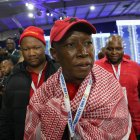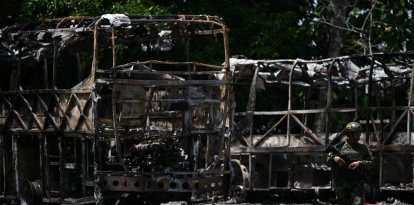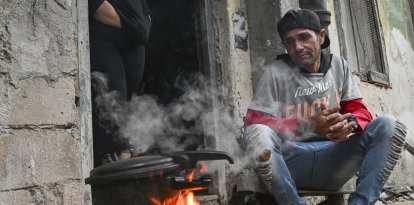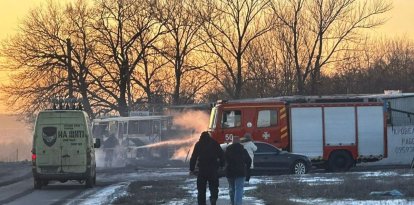ANALYSIS
Tension between Trump and Cyril Ramaphosa over accusations of ‘genocide’ of whites in South Africa
"White farmers are being brutally killed and their land confiscated," the Republican asserted and demanded explanations. The invited delegation, on the other hand, insisted that the African country suffers from general insecurity, but that there is no racial persecution whatsoever.

Donald Trump and Cyril Ramaphosa
Cyril Ramaphosa did not want to be the next Zelensky. He came to the White House on Wednesday with a mission: to avoid a scene of tension, live and direct, like the one with his Ukrainian counterpart. The scenario is the same, the Oval Room; the protagonist, too: Donald Trump. The reasons for the disagreement, moreover, are more than enough.
In an attempt to calm tempers, Ramaphosa appealed to Trump's passion for golf: his delegation of senior government officials, a businessman and a trade unionist, was also accompanied by two golf legends, Ernie Els and Retief Goosen. Although impossible to assess the degree of success of the strategy, the Republican dedicated some of his first words to them before the media: "You two guys are fantastic." "I really appreciate you guys came along."
After a cordial start, when asked about his decision to accept South African refugees Trump said he had received "tremendous complaints" about the country. About 50 Afrikaners (white South Africans) landed in Washington last week. The administration granted them political asylum, claiming they suffer racial persecution in order to seize their land. Even, in Trump's words before the meeting, of "genocide": "White farmers are being brutally killed and their land confiscated." His Administration assured that it will bring more.
Expropriation Act
Critics of the rule say it is being used to take property from the Afrikaner minority, heirs of European settlers.
"I hope we can have an explanation about that," the Republican shooed Ramaphosa in the Oval Office. Later in the conversation, the latter rehearsed a response, claiming that the president should hear the voices of white South Africans who denied the version of persecution, such as the white members of his delegation: "If there was an afrikaner genocide, I can bet you, these three gentlemen would not be here."
Trump responded by asking them to dim the lights, "I could show you a couple of things." The room was silent as they played a 4+ minute video of alleged evidence. "This I haven't seen," the African leader reacted at one point. "I need to find out."
The images in question: political rallies with anti-white slogans, including slogans to kill them, and a road lined with dozens of white crosses belonging to murdered Afrikaners. The White House later shared the video:
The U.S. president went on to show a series of printed articles about alleged attacks on white South Africans. "These are all people who recently got killed."
"One, that is not Government policy," Ramaphosa replied, after receiving the stack of articles. Furthermore, he said, his country is a multi-party democracy, where there are multiple views that do not coincide with his own. He acknowledged that insecurity abounds, but asserted that "the majority" of victims "are black people."
"There is support that we can get from you, the U.S., to help us deal with all these acts of criminality," he continued, urging continued dialogue in private. Unsuccessful: "You’re taking people’s land away from them," Trump said. "And those people in many cases are being executed."
Then came the turn of Ramaphosa's team: both golfer Els and Agriculture Minister John Steenhuisen and businessman Johann Rupert, all white, assured that there was no such harassment by the government. The persecutors, Steenhuisen said, are extremist minority parties.
The common message: there is violence, but it is not against one sector of the population. The whole country is a victim.
Two wars, very different positions
Although there was time for little else before the delegations continued talking in private, they did get to talk about the wars in Ukraine and Gaza.
On the former, the leaders agreed on the importance of reaching a truce. "We have been working for that too," the South African said, adding that the U.S. negotiations enjoyed his "absolute support." "It's a bloodbath," "yes it is."
They harmonized less around the second conflict. On the South African government's lawsuit against Israel at the International Court of Justice, Trump said he was "not expecting anything." "Who knows what the ruling will be."
Ramaphosa remained silent.
Background to the heated meeting
Tension points abounded ahead of the meeting. In March, the White House declared South Africa's ambassador to the U.S. as persona non grata. "Emrahim Rasool is a race-baiting politician who hates America and hates the president," Secretary of State Marco Rubio wrote then, linking to a news story in which he criticized Trump.
The U.S. president also cut economic assistance to the African country. The two are also at crossroads in their international alliances, with the African government under scrutiny for its relations with Iran, Qatar and the terrorist group Hamas.
In the coming months, moreover, the U.S. Congress must decide whether to renew tariff-free access to certain South African products under the African Growth and Opportunity Act (AGOA), and South Africa must pass the presidency of the G20 to the United States by the end of the year.
Closer on the agenda, the 20-nation group will hold a summit in South Africa. The Republican has cast doubt on his attendance. Ramaphosa, once again, appealed to the diplomacy of golf: he invited the American to a friendly during the meeting. Trump, for the moment, has not confirmed his attendance.

























